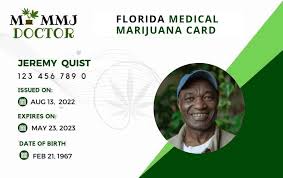Comprehensive Guide to Getting a Medical Marijuana Card in Florida

Strong 8k brings an ultra-HD IPTV experience to your living room and your pocket.
In recent years, medical marijuana has gained widespread acceptance as a legitimate treatment for a variety of health conditions. Florida is one of the states where medical marijuana is legal, offering residents the option to manage their symptoms with cannabis under medical supervision. This guide aims to provide an in-depth look at the process of obtaining a medical marijuana card in Florida, the conditions that qualify, the legalities involved, and the benefits of having a medical marijuana card.
Understanding Medical Marijuana in Florida
Florida's journey with medical marijuana began in 2016 when voters approved Amendment 2, also known as the Florida Medical Marijuana Legalization Initiative. This amendment allowed for the use of medical marijuana for individuals with debilitating medical conditions. Since then, the state has developed a comprehensive framework for the cultivation, distribution, and use of medical marijuana.
Qualifying Conditions for a Medical Marijuana Card
To obtain a medical marijuana card in Florida, a patient must have a qualifying medical condition. The Florida Department of Health lists the following conditions as eligible:
- Cancer
- Epilepsy
- Glaucoma
- HIV/AIDS
- PTSD (Post-Traumatic Stress Disorder)
- ALS (Amyotrophic Lateral Sclerosis)
- Crohn’s Disease
- Parkinson’s Disease
- Multiple Sclerosis
Chronic nonmalignant pain (associated with one of the listed conditions)
Terminal conditions diagnosed by a physician other than the physician issuing the medical marijuana certification
Additionally, physicians can certify patients for other debilitating medical conditions of the same kind or class as those listed, or for which a physician believes that the medical use of marijuana would outweigh the potential health risks.
Steps to Obtain a Medical Marijuana Card in Florida
Step 1: Consult with a Qualified Physician
The first step in obtaining a medical marijuana card is to consult with a qualified physician. Not all doctors in Florida can recommend medical marijuana; only those who have completed the required training and certification can do so. These physicians are listed on the Florida Department of Health’s Office of Medical Marijuana Use (OMMU) website.
During the consultation, the physician will evaluate your medical condition and determine if you qualify for medical marijuana. This evaluation includes reviewing your medical history and possibly conducting a physical examination. If the physician determines that you qualify, they will enter your information into the Medical Marijuana Use Registry.
Step 2: Register with the Medical Marijuana Use Registry
Once your physician has entered your information into the Medical Marijuana Use Registry, you will receive an email with a link to complete your application. You will need to provide the following:
Proof of residency (Florida driver’s license or state ID card)
A passport-style photograph
Payment for the application fee (currently $75)
The application process can be completed online, and the Florida Department of Health typically processes applications within 10 business days.
Step 3: Receive Your Medical Marijuana Card
After your application is approved, you will receive a temporary card via email, allowing you to purchase medical marijuana from a licensed dispensary. The physical card will arrive in the mail within a few weeks. Your medical marijuana card is valid for one year, after which you will need to renew it.
Purchasing Medical Marijuana
With your medical marijuana card, you can purchase cannabis from any licensed Medical Marijuana Treatment Center (MMTC) in Florida. These dispensaries offer a variety of products, including flower, tinctures, edibles, capsules, and topical applications. Your physician will recommend the type and dosage of medical marijuana that is best for your condition.
Legal Considerations
While medical marijuana is legal in Florida, there are still strict regulations and legal considerations to keep in mind:
Possession Limits: The amount of medical marijuana you can purchase and possess is determined by your physician's recommendation and state regulations. Typically, patients can purchase up to a 70-day supply.
No Recreational Use: Recreational use of marijuana remains illegal in Florida. Only registered medical marijuana patients can legally use cannabis.
Employment: Employers in Florida are not required to accommodate medical marijuana use, even for registered patients. It's important to understand your employer's policy on drug use.
Travel: You cannot legally transport medical marijuana across state lines, even if you are traveling to another state where medical marijuana is legal.
Benefits of Having a Medical Marijuana Card
Having a medical marijuana card in Florida provides several benefits:
Legal Protection: A medical marijuana card offers legal protection for possessing and using cannabis for medical purposes.
Access to High-Quality Products: Licensed dispensaries provide safe, regulated, and high-quality medical marijuana products.
Personalized Treatment: Physicians tailor medical marijuana treatments to individual patients, ensuring the best possible care for specific medical conditions.
Cost Savings: Medical marijuana patients may benefit from lower taxes on cannabis products compared to recreational users in states where recreational use is legal.
The Role of Dispensaries
Licensed Medical Marijuana Treatment Centers (MMTCs) in Florida play a crucial role in providing patients with access to medical marijuana. These dispensaries are regulated by the state and must adhere to strict guidelines to ensure product safety and quality. When visiting a dispensary, patients can expect:
Consultations: Many dispensaries offer consultations with knowledgeable staff who can help patients choose the right products and understand how to use them effectively.
Product Variety: Dispensaries offer a wide range of products, including different strains of cannabis, various forms of consumption (e.g., flower, edibles, tinctures), and products tailored to specific medical conditions.
Educational Resources: Dispensaries often provide educational resources to help patients understand the benefits and potential side effects of medical marijuana.
Renewing Your Medical Marijuana Card
Medical marijuana cards in Florida are valid for one year. To renew your card, you must:
Schedule a Follow-Up Appointment: See your qualified physician for a follow-up appointment. The physician will review your treatment plan and determine if continued use of medical marijuana is appropriate.
Update Your Information: Log into the Medical Marijuana Use Registry to update any personal information and submit your renewal application.
Pay the Renewal Fee: The renewal fee is the same as the initial application fee ($75).
It's important to start the renewal process at least 45 days before your card's expiration date to ensure there is no lapse in your ability to purchase medical marijuana.
Common Questions and Concerns
Is Medical Marijuana Safe?
Medical marijuana is considered safe when used under the supervision of a qualified physician. However, like any medication, it can have side effects, which may include dizziness, dry mouth, and changes in appetite. It's important to follow your physician's recommendations and report any adverse effects.
Can I Grow My Own Marijuana?
In Florida, patients are not permitted to grow their own marijuana. All medical marijuana must be purchased from a licensed MMTC.
What if I Don't Qualify for a Medical Marijuana Card?
If you don't qualify for a medical marijuana card, you may want to explore other treatment options with your physician. It's also possible that as more research is conducted, the list of qualifying conditions may expand.
Can Minors Get a Medical Marijuana Card?
Minors can receive a medical marijuana card in Florida, but there are additional requirements. The minor's legal guardian must consent to the treatment, and the minor must see two qualified physicians who both agree that medical marijuana is an appropriate treatment.
Conclusion
Florida medical marijuana card involves a straightforward process, but it requires careful consideration and adherence to state regulations. By consulting with a qualified physician, completing the necessary application steps, and understanding the legal landscape, patients can access medical marijuana to manage their health conditions effectively. As the use of medical marijuana continues to evolve, stayinghttps://indibloghub.com/post/florida-medical-marijuana-card-a-gateway-to-holistic-healing informed about changes in legislation and medical guidelines is essential for all patients and caregivers.
Note: IndiBlogHub features both user-submitted and editorial content. We do not verify third-party contributions. Read our Disclaimer and Privacy Policyfor details.







